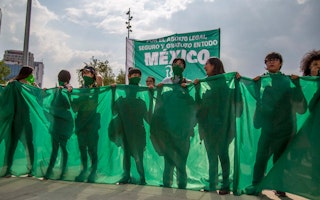Litigating for the Statistical Visibility of Afrodescendants in Colombia
By Dayana Blanco Acendra

Colombia conducts its National Population and Housing Census every 10 years—providing the government with population statistics that play an invaluable role in shaping the distribution and provision of all government services—from schools and hospitals, to access to courts and police. So it was a tremendous shock when, in 2019, the new national census showed a 30 percent drop in the country’s Afro-descendant population—from 4,311,757 in the 2005 Census to 2,982,224 in the 2018 one.
Save mass migration or a major disaster, it was impossible for this population to have declined so sharply. On the contrary, it should have been increasing. At my organization, which is focused on ensuring the legal rights of Afro-descendant Colombians, we could see there had been a miscount. We knew that this would have a dire impact on political representation, the national budget, and the allocation of budgets and services to our community.
For our community, this was also part of a longer story of social and systemic invisibility since Colombia’s independence from Spain in 1810. During the colonial era, enslaved Black people were registered not as human beings but as merchandise; when they were finally unchained from this injustice in 1852, their racial and ethnic identity was omitted from population records, allegedly to make Colombia a more “homogeneous” society.
ILEX was founded in 2018 by five Afro-Colombian lawyers, including myself. We had just finished University of California, Los Angeles’s Critical Race Studies Program, a professional development fellowship sponsored by the institution’s College of Law, and we were looking for ways to give back to our community.
Law is a tool for social transformation, but it has historically been used to serve institutions maintaining structures of oppression and inequality. With that in mind, we decided to create an Afrodescendant-led legal team focused on investigating and then developing strategic litigation and communications campaigns around racial justice.
The travesty of the 2018 census provided us with an immediate target for action.
In 2020, we filed a lawsuit against the census’s issuing agency, the National Administrative Department of Statistics (DANE), joining with with five other Afro-descendant organizations: The Process of Black Communities; the Association of Community Councils of Norte de Cauca; the Association of Displaced Afro-Colombians; and the Association of Black Economists.
In 2019, we started a conversation with academics, public institutions, and economic experts with the goal of making our case in Colombia’s court system, and in 2020, we were able to challenge the census results in the Constitutional Court, Colombia’s highest tribunal body.
In 2022, the Constitutional Court ruled that the implementation of the 2018 census had caused irreparable damage to the country’s Afro-descendant population; that the numbers needed to be corrected through other data collection agencies; and that DANE needed to create a “lessons learned” document describing errors in three of the censuses Colombia had carried out since 1993 (the first time the census had included an Afro-descendant self-identification question).
But given the miscounts we’ve seen over the past 31 years, we remain deeply concerned that DANE will still not have corrected the systemic issues that have led to repeated failures in time for the next census, which will likely be held in 2028 or 2030. This is now an important focus of our work.
Following the 2022 court ruling DANE merely admitted past failures—but it didn’t explain how to fix a system that had clearly failed. We still don’t know the factors that need to be taken into account to ensure effective participation of Afrodescendants. Are part of the failures the result of Colombia’s history of armed conflict? Failing infrastructure such as faulty roads and highways? Or racism and prejudice?
At the same time, the agency has publicly maintained that it has fully complied with the Constitutional Court ruling.
Given the importance of the issues that remain unaddressed, we have now asked the Constitutional Court to assume an oversight role in the run up to the next census—to monitor the process, to observe, and to establish guidelines for compliance with its rulings in order to ensure that the next census counts all Colombians regardless of ethnic background.
At the same time, we and other civil society groups are working hard to explain the issues that remain unaddressed to both the Colombian people, via the media, and to the current government (which includes Vice President Francia Márquez Mina, the first Black person to be elected to that position). Challenging as it is, we are making headway and I believe our efforts can serve as a visibility blueprint for Afro-descendants across the globe.
We hope too that Afro-descendant people in other parts of Latin America will be inspired by our work in Colombia—and that people of all backgrounds will recognize and support this broader struggle for fair treatment—which demands that everyone is seen, and that everyone counts and is counted.
ILEX Legal Action is a grantee of the Open Society Foundations.
Dayana Blanco Acendra is director of ILEX Legal Action.


